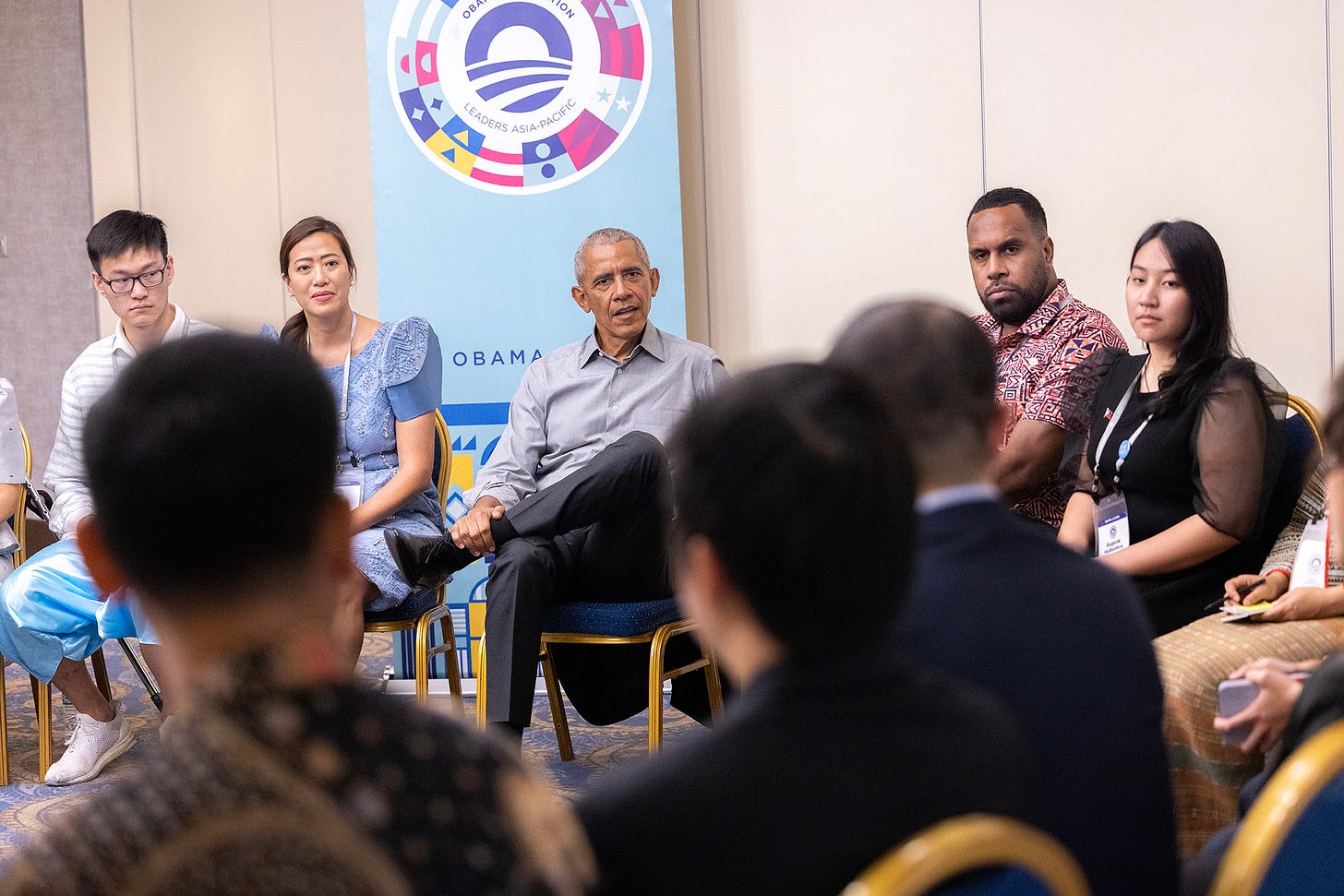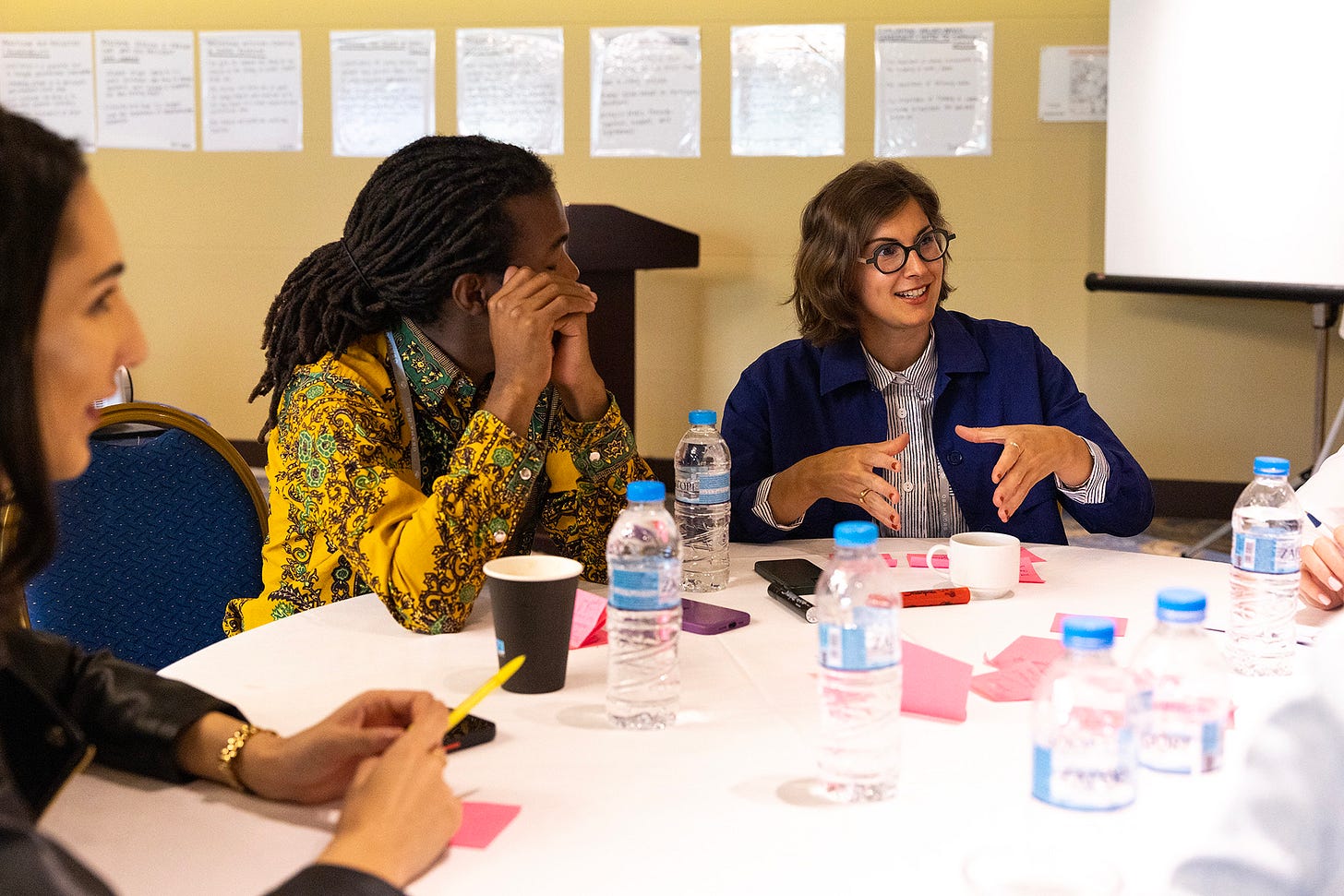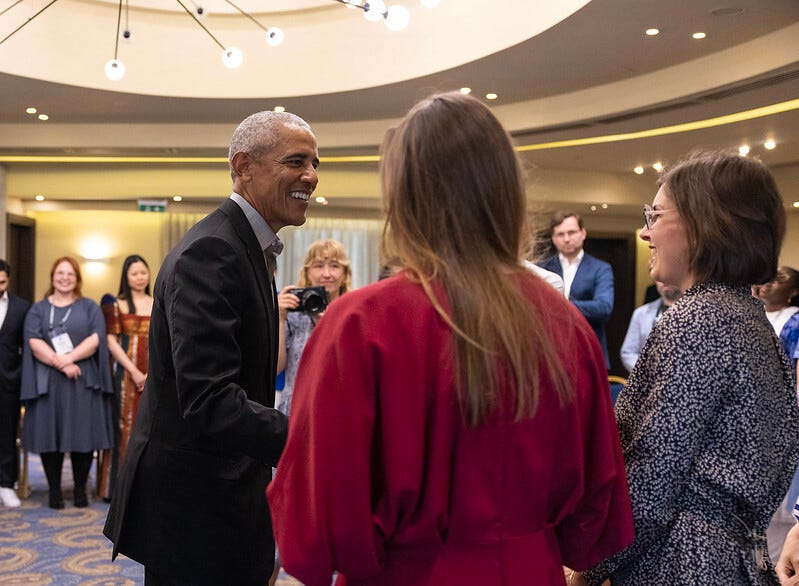Barack Obama Discusses Citizens’ Assemblies
Our Founder and CEO Claudia Chwalisz writes about her exchange with the former U.S. president

Over the past six months, it’s been an honour to be part of the Obama Leaders programme on values-based leadership. It concluded last month with five rich days in Athens, a key place for the history of democracy and a meeting point of North and South, East and West. It was a chance to meet my fellow Obama Leaders from Europe, Africa, and Asia-Pacific, as well as an opportunity to exchange with President Obama himself.
After months of Zoom meetings, the energy of being together on a rooftop overlooking the Acropolis, of being able to give each other hugs and share food and laughter together, cemented some deep friendships and was truly a moment I will cherish.
This was not just some theoretical course about leadership; it entailed doing some introspection and deeper work on self, including discomfort, tension, frustrations. We listened to each others’ stories, which involved fleeing war zones and persecution, harassment, rape, suicides in our families, mental health struggles, deaths of loved ones, but also finding strength and courage, the kindness of strangers, starting new movements, companies, and organizations, balancing parenthood and personal lives with work passions. We offered each other our presence, support, and a space to be vulnerable.
This remarkable group of people moved me to tears more than once, and I am grateful to know each and every one of them. I also have immense gratitude to our programme directors and facilitators for their care and attention to weave these connections.
Of course, it was also incredible to have a chance to exchange with President Obama about democracy and Citizens’ Assemblies during our session with him and the fellow Europe Leaders.
After introducing myself and the work we are doing at DemNext, I was able to ask him a question about the systemic democratic shifts that are needed and how we should navigate shifting power to everyday people—in a way that channels our collective wisdom and enables us to find common ground.
What did President Obama say in response?
Beyond telling me that it sounds like I’m better placed to answer the question than he is (very flattering), the overarching essence was that we need more experimentation with Citizens’ Assemblies, in the U.S. and across borders.
We live in a time when people feel distant from government in many ways, where voting isn’t enough, and we can create more direct forms of democracy that allow people to practice self-government, to debate and deliberate and make decisions. This would make politics more engaging and considered.
President Obama made a few more thoughtful points, some of which I agree and disagree with! Because the sessions were private, I cannot go into complete detail. But what he’s made clear again and again is that he doesn’t believe that merely tinkering with procedures will solve all of our problems. He is interested in ways to deeply reinvigorate democracy—that is, to better exercise our democratic muscles as citizens.
How do we do this? The example of the recent French Citizens’ Assembly on End of Life helps point the way.
Deliberating on how France’s legislation on euthanasia and related issues should change, 184 out of the 185 original members participated in the duration of the process—meaning 27 days of deliberation over four months. Only one person dropped out due to a change of job. Watch our new video explaining how it worked:
The data in the OECD deliberative wave study that I led with Ieva Cesnulaityte with around 600 examples around the world shows us that people are willing and able to devote the numerous days and months to being a Citizens’ Assembly member under inclusive conditions—if it is clear that their time will lead to change in the law, policy, the constitution; if they are paid, childcare is provided and other costs of participating are covered.
We need to break down the barriers to participating, and ensure that people’s precious time is not being wasted on mere consultation that gets ignored.
How can these models for decision making be applied to, for example, seemingly intractable and global issues like housing affordability? The way in which we take decisions related to housing, homelessness, transport, climate, and all the other inter-related issues under the general umbrella of ‘city planning’ feels dysfunctional everywhere. This is a frustration not just to citizens, but also to elected officials, civil servants, developers, architects, planners, and other stakeholders.
It’s why this is one of the strategic areas of work for my colleagues at DemocracyNext and I on this issue. We have just launched an International Task Force on Democratising City Planning, where we will work together to develop a new model of democratic decision making on these issues that helps overcome these common challenges.
As a non-partisan institute, our goal is to collaborate with as many individuals and groups as we can from all quarters—left, right or centre, big or small, established or little-known—to shift power to everyday people for a more just and joyful future. My hope is that this is but the beginning of a wider conversation with President Obama, his colleagues at the Obama Foundation, my fellow Obama Leaders, and others from across the political spectrum about the democratic transformation needed to shift power and change the rules of the game.
🗳 Further reading: How might I answer the question that I posed to President Obama? I took on these questions about the future of democracy in a new essay for RSA Journal:
I once viewed citizens’ assemblies as a necessary complement to strengthen representative democracy as we conceive of it today. However, conducting a deeper analysis of hundreds of assemblies when I was at the OECD, and being involved in the design of the world’s first permanent citizens’ chambers with people selected by lot, changed my perspective. The more fundamental issue is that a system defined by elections, with political parties and politicians, is designed for short-termism, for debate, for conflict and for polarisation. It puts re-election goals and party logic ahead of the common good. Adding on new forms of democratic institutions like citizens’ assemblies to an electoral system does not address the underlying democratic problems of an elections-based system.
We have a wealth of evidence today that citizens’ assemblies are effective and democratic – leading to better decisions by leveraging our collective intelligence – and that they are fair and legitimate, recognising people’s agency and establishing political equality. But one-off assemblies are not changing the system. There is a need to shift political and legislative power to institutionalised citizens’ assemblies so that they can eventually become the heart of our democratic systems, defining a new democratic paradigm.








"Adding on new forms of democratic institutions like citizens’ assemblies to an electoral system does not address the underlying democratic problems of an elections-based system."
If a majority in the highest governing authority had candidates who had promised, perhaps legally promised to the best of their abilities to bring into law the binding decisions of Citizens Assemblies then why not?
All government shall have a risk of being corrupted as our present democracies show.
Voting them out at national elections or international elections provides safeguards against such powerful and hazardous institutional dangers.